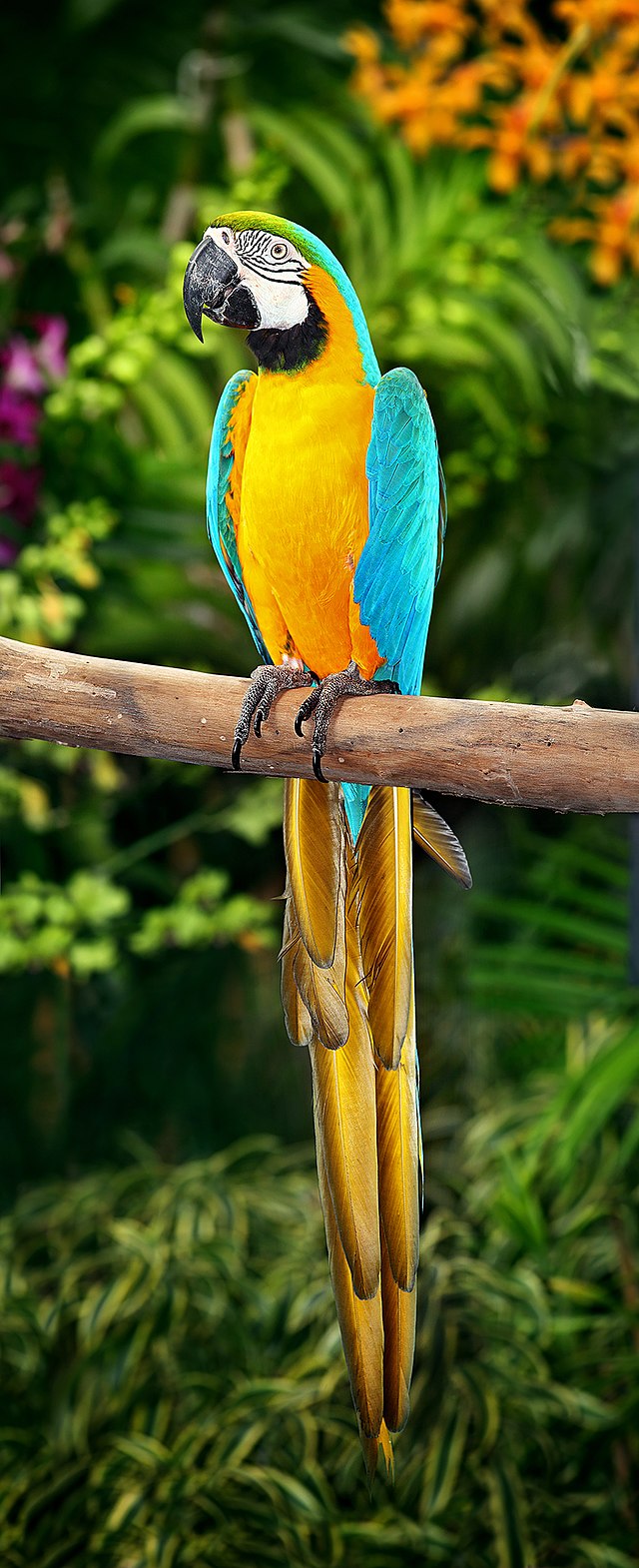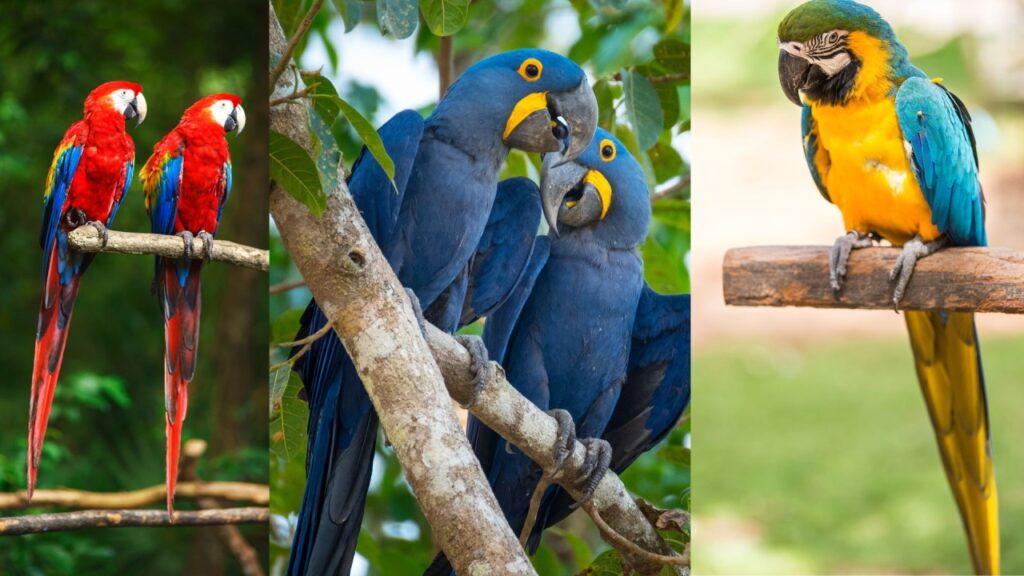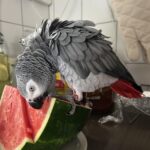A Macaw parrot costs between $1,000 and $5,000, depending on the species and age. Prices can vary widely based on rarity and breeder reputation.
Macaw parrots are vibrant, intelligent birds known for their striking colors and sociable nature. These beautiful birds can live up to 50 years, making them a long-term commitment. Macaws require ample space, mental stimulation, and a diet rich in fruits, vegetables, and nuts.
Prospective owners should be prepared for the demands of caring for such an engaging pet. Regular veterinary check-ups, social interaction, and environmental enrichment are essential for their well-being. Macaws thrive in environments where they receive plenty of attention and mental challenges. Investing in a macaw means dedicating time, effort, and resources to ensure a healthy, happy life for your feathered friend.
Introduction To Macaw Parrots
Macaw parrots are vibrant, intelligent birds. They are known for their colorful feathers and friendly nature. These majestic birds captivate many bird lovers.
Fascinating Facts
- Colorful Feathers: Macaws have bright and varied plumage.
- Long Lifespan: They can live up to 50 years or more.
- Social Birds: Macaws thrive on interaction and play.
- Large Size: Some species can reach up to 40 inches in length.
Why They Are Popular Pets
Macaws are popular pets due to their vivid colors and friendly demeanor. They are also highly intelligent and can learn tricks and words. Their playful nature makes them entertaining companions.
Here are some reasons why macaws are favored:
- Interactive: They enjoy engaging with their owners.
- Trainable: Macaws can be taught to perform tricks.
- Affectionate: These birds form strong bonds with humans.
- Visually Stunning: Their colorful feathers are a sight to behold.

Credit: en.wikipedia.org
Types Of Macaw Parrots
Macaw parrots are colorful, intelligent birds known for their vibrant feathers and engaging personalities. They come in various types, each with unique characteristics. Understanding the different types can help you choose the perfect companion.
Common Species
Some macaws are more commonly found as pets due to their popularity and availability.
- Blue and Gold Macaw: These are known for their striking blue and gold feathers.
- Scarlet Macaw: Famous for their bright red, yellow, and blue plumage.
- Green-winged Macaw: They have a mix of red, green, and blue colors.
- Military Macaw: Recognizable by their green body and red forehead.
- Hyacinth Macaw: The largest of the macaws, with beautiful blue feathers.
Rare Species
Some macaw species are rare and more challenging to find.
- Spix’s Macaw: Known as the Little Blue Macaw, they are critically endangered.
- Great Green Macaw: Also called Buffon’s Macaw, facing habitat loss.
- Red-fronted Macaw: Native to Bolivia, they have a distinctive red forehead.
- Blue-throated Macaw: Endangered species with blue throats and yellow bodies.
Understanding these types helps in making an informed decision. Each macaw species has its own charm and requirements.
Initial Purchase Cost
Purchasing a Macaw parrot involves various costs. The initial purchase cost is a major part. This cost can vary based on different factors. Let’s explore the initial purchase cost in detail.
Breeder Prices
Buying from a breeder can be expensive. Breeder prices vary widely. Factors include the parrot’s breed, age, and health. Some breeders charge more for rarer breeds. The price range for Macaws is typically between $1,000 and $5,000. Certain rare species can cost even more. Always ensure the breeder is reputable.
Adoption Fees
Adopting a Macaw can be more affordable. Adoption fees are generally lower than breeder prices. Fees range from $200 to $1,000. Adoption centers often include initial health checks in the fee. This can save you money on vet bills. Adoption also gives a home to a parrot in need.

Credit: www.facebook.com
Housing And Habitat Expenses
Owning a macaw parrot involves more than just the initial purchase. One of the significant costs is housing and habitat expenses. Ensuring your macaw has a comfortable and enriching environment is crucial for its health and happiness.
Cage Requirements
Macaws need large cages to accommodate their size and wingspan. The cage should be at least 36 inches wide, 48 inches deep, and 60 inches high. Stainless steel cages are the best choice due to their durability and ease of cleaning.
Here’s a quick overview of cage requirements:
- Size: Minimum 36x48x60 inches
- Material: Stainless steel
- Bar Spacing: 1 to 1.5 inches
- Perches: Multiple perches of varying diameters
- Food and Water Bowls: Securely attached bowls
Environmental Enrichments
Macaws are intelligent and need mental stimulation. Environmental enrichments are essential to prevent boredom and destructive behavior.
Some essential enrichments include:
- Toys: Chewable toys, puzzle toys, and foraging toys
- Perches: Natural wood perches and rope perches
- Play Gym: A separate play gym outside the cage
- Interactive Time: Daily interaction with family members
Here’s a table summarizing the typical costs of essential items:
| Item | Approximate Cost |
|---|---|
| Cage | $500 – $2000 |
| Toys | $10 – $50 each |
| Play Gym | $100 – $300 |
| Perches | $10 – $30 each |
Ensuring your macaw has a suitable habitat can be costly. But it is essential for a happy, healthy pet.
Feeding Costs
Feeding a Macaw parrot is a significant part of its overall cost. Ensuring a balanced diet is crucial for its health. This section explores the essentials of a Macaw’s diet and the monthly food budget.
Diet Essentials
Macaws need a varied diet to stay healthy. Their diet should include:
- Pellets: These are a primary food source.
- Fresh Fruits: Apples, bananas, and berries are great choices.
- Fresh Vegetables: Carrots, broccoli, and spinach work well.
- Nuts: Almonds and walnuts provide essential fats.
- Seeds: Sunflower and pumpkin seeds are favorites.
Monthly Food Budget
The monthly cost for feeding a Macaw can vary. Here’s a breakdown:
| Food Item | Estimated Monthly Cost |
|---|---|
| Pellets | $20 – $30 |
| Fresh Fruits | $10 – $20 |
| Fresh Vegetables | $10 – $15 |
| Nuts | $10 – $20 |
| Seeds | $5 – $10 |
On average, expect to spend around $55 to $95 monthly on food.
Healthcare And Veterinary Bills
Owning a macaw parrot involves more than just the initial purchase cost. Healthcare is a significant ongoing expense. Veterinary bills can add up quickly, making it important to budget accordingly. Understanding these costs will help you provide the best care for your feathered friend.
Routine Checkups
Routine checkups are essential for maintaining your macaw’s health. These visits ensure your bird is in good shape. Regular exams help catch issues early. Expect to visit the vet at least once a year.
| Service | Average Cost |
|---|---|
| Annual Exam | $50 – $100 |
| Vaccinations | $20 – $50 |
| Beak and Nail Trimming | $10 – $30 |
Emergency Care
Emergencies can happen anytime. Being prepared for them is crucial. Unexpected health issues can be costly. Emergency care is often more expensive than routine checkups.
- Broken bones
- Respiratory issues
- Infections
Emergency visits can range from $200 to $500. Surgery or intensive care can cost even more. It’s wise to have an emergency fund for such situations.
Training And Socialization
Training and socialization are crucial aspects of raising a Macaw parrot. These intelligent birds need proper guidance to thrive. Here, we will discuss their behavioral training and social interaction needs.
Behavioral Training
Behavioral training helps Macaw parrots develop good habits. Start training when they are young. Use positive reinforcement techniques. Reward them with treats for good behavior. Consistency is key in their training process.
Interactive toys can aid in their training. These toys keep them mentally stimulated. Teach simple commands like “step up” and “come.” Gradually introduce more complex tasks. Training sessions should be short but regular.
Social Interaction Needs
Macaw parrots are social creatures. They need regular interaction with their owners. Spend at least two hours a day with them. Engage in activities like playing and talking. This builds a strong bond between you and your bird.
Introduce them to different environments. This helps them adapt and stay calm. Socialization reduces their stress levels. It also prevents behavioral issues like screaming and feather plucking.
Consider socializing them with other birds. Supervised playdates can be beneficial. They learn social cues and communication skills. Ensure these interactions are safe and positive.
In summary, proper training and socialization are essential for a happy and healthy Macaw. Follow these tips to ensure your feathered friend thrives.
Credit: www.quora.com
Ongoing Maintenance Costs
Owning a macaw parrot involves more than just the initial purchase price. Ongoing maintenance costs play a significant role in the overall expense. These costs ensure the health and happiness of your feathered friend. Below, we break down some of the key ongoing expenses.
Grooming Supplies
Grooming supplies are essential for keeping your macaw clean and healthy. Regular grooming helps prevent infections and maintains their beautiful feathers. Here are some necessary grooming supplies:
- Bird-safe shampoo
- Nail clippers
- Feather conditioner
- Beak polish
- Grooming perch
These items ensure your macaw stays in top shape. They also help in early detection of health issues.
Toys And Accessories
Toys and accessories keep your macaw mentally and physically stimulated. They are crucial for preventing boredom and destructive behavior. Here are some must-have items:
- Chew toys
- Interactive puzzles
- Swings
- Climbing ropes
- Perches of various textures
Rotating these items regularly keeps your macaw engaged. Quality toys and accessories also promote exercise, which is vital for their well-being.
Maintaining a macaw parrot is a rewarding but ongoing commitment. Proper grooming supplies and engaging toys are critical for their health and happiness.
Conclusion
Purchasing a Macaw parrot can be a significant investment. Prices vary based on species, age, and breeder reputation. These beautiful birds require proper care and attention. Ensure you’re ready for the commitment before buying. Research thoroughly to find a healthy and happy companion.
Your efforts will be rewarded with a loyal, colorful friend.
Ryan Everhart is a passionate bird enthusiast and blogger, primarily writing on his website, Avian Whispers. His journey into the world of bird blogging began with a deep interest in parrots, a species that captivated his attention for their intelligence and social behavior. Over time, his content expanded to cover a broader range of bird species, offering insights into bird behavior, care, habitats, and conservation.
Ryan is dedicated to educating his audience, which includes both new bird owners and seasoned enthusiasts. His writing is filled with personal experiences, expert knowledge, and practical advice on bird care. Through Avian Whispers, he aims to foster a deeper appreciation for birds, emphasizing their role in nature and the joys of having them as pets.
Starting with articles focused on parrots, Ryan’s work now encompasses a diverse range of topics such as feeding, training, habitat enrichment, and bird health. His love for birds extends beyond parrots, diving into various avian species. His informative and heartfelt writing reflects his commitment to the well-being of birds and the desire to help others connect with these creatures.
As a growing voice in the bird blogging community, Ryan strives to provide a platform where bird lovers can learn, share experiences, and connect over a shared passion for avian life. His blogs are not only educational but also serve as a reminder of the importance of protecting and nurturing the bond between humans and birds.




